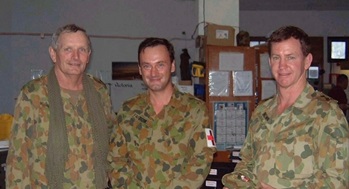2025 | Volume 26 | Issue 1

Dr Glendon Farrow OAM
Author: Dr Glendon Farrow OAM FRACS
We were teamed with the Egyptians at the UN Hospital in Dili in 2000. They were celebrating Yom Kippur, which seemed odd. We were shown a scratchy black and white film showing Egyptian forces using water cannon to breach the Israeli side of the Suez Canal. Operation Badr on 6 October 1973 is still celebrated today. The rest of the Yom Kippur War didn’t go so well. We didn’t want to offend our hosts. Just “don’t mention the war”i.
In 1975 Indonesia annexed East Timor after the former colonial master Portugal departed. For nearly 25 years the new province was blighted by violence, often after regular votes for independence. In 1999 after another election, violence spiralled out of control and the Australian-led International Force in East Timor (INTERFET) deployed to restore order. The United Nations Transitional Force in East Timor (UNTAET) took over in February 2000 and established a multinational military hospital for UN personnel only.
It was very quiet surgically. As Spike Milligan once wrote about sentry duty: "then, suddenly, without warning, nothing happened” .ii The medics were frustrated but as I pointed out, if I was busy someone else was having an extremely bad day. Quiet was good.
On arrival we lined up at the armoury to draw weapons. Reciting my regimental number a voice rang out. “Oi, were you at Melbourne University regiment?”
Matt, the intensivist, and I had almost identical regimental numbers having enlisted at the same time in 1977. Our paths only crossed 23 years later in East Timor. Small world.
After weapons were issued, we were shown a very small hole in a tent, a puncture repair patch on an inflatable Trelleborg tent and an impact mark on the compound wall. They lined up perfectly. A specialist cleaning his weapon had accidentally fired a live round through the hospital.
As a result, we were given special attention. Eventually I could strip and reassemble a Steyr rifle with a pillowcase over my head. This is a useful skill to have. Learning to operate while being kept in the dark is an essential skill for any public hospital surgeon.
The hospital was a mix of shipping containers, Trelleborg tents and canvas tents. Containers housed the operating theatres, Trelleborg tents the resus cubicles and ward areas—all attached to a former library building used for administration, with a dome for a roof affectionately known as the lemon squeezer.

Left-right: Maj Gen Simon Willis, Dr Farrow, Brig. Bob Brown
More old colleagues appeared being my former commanding officer and his second in command from 3RARiii—now senior officers—wanting to inspect the hospital. They remembered me well, not as an exemplary medical officer but as the doctor who broke into another battalion’s medical centre under cover of darkness, to ‘borrow’ doxycycline for a rapid deployment to Vanuatu in 1988. We were armed to the teeth awaiting the order to go while I scurried around in the dark looking for doxy. But I digress.
The most curious sight in Dili was the UN hotel, which was a huge former Russian hospital ship moored at the dock. Not living among the locals caused a lot of offence, as did shaking hands with sunglasses on. Culturally it was important to see your eyes. My 40th birthday party was in a little make-do restaurant on the top deck. I don’t remember the food, but I do remember the balmy breeze blowing in from the Timor Sea.
On departure from East Timor, we all had a psychology debrief. Matt opened up about feeling very guilty. He was getting a medal for not doing much. The young psychologist took him very seriously indeed and earnestly replied that this was a common feeling after Vietnam. He didn’t realise that while Matt had a Fellowship in Intensive Care, he also had a special interest in tormenting psychologists.
[i] John Cleese, Fawlty Towers: Season 1, Episode 6
[ii] Adolf Hitler: My Part in his Downfall: Spike Milligan Penguin House 2012 ISBN-10 0241958091
[iii] 3rd Battalion Royal Australian Regiment (Parachute)